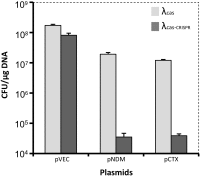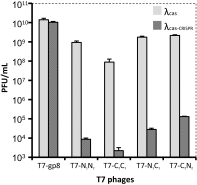Temperate and lytic bacteriophages programmed to sensitize and kill antibiotic-resistant bacteria
- PMID: 26060300
- PMCID: PMC4466736
- DOI: 10.1073/pnas.1500107112
Temperate and lytic bacteriophages programmed to sensitize and kill antibiotic-resistant bacteria
Abstract
The increasing threat of pathogen resistance to antibiotics requires the development of novel antimicrobial strategies. Here we present a proof of concept for a genetic strategy that aims to sensitize bacteria to antibiotics and selectively kill antibiotic-resistant bacteria. We use temperate phages to deliver a functional clustered regularly interspaced short palindromic repeats (CRISPR)-CRISPR-associated (Cas) system into the genome of antibiotic-resistant bacteria. The delivered CRISPR-Cas system destroys both antibiotic resistance-conferring plasmids and genetically modified lytic phages. This linkage between antibiotic sensitization and protection from lytic phages is a key feature of the strategy. It allows programming of lytic phages to kill only antibiotic-resistant bacteria while protecting antibiotic-sensitized bacteria. Phages designed according to this strategy may be used on hospital surfaces and hand sanitizers to facilitate replacement of antibiotic-resistant pathogens with sensitive ones.
Keywords: CRISPR-Cas; ex vivo treatment; lysogenization; positive selection.
Conflict of interest statement
The authors declare no conflict of interest.
Figures




References
-
- Barrangou R, et al. CRISPR provides acquired resistance against viruses in prokaryotes. Science. 2007;315(5819):1709–1712. - PubMed
Publication types
MeSH terms
Grants and funding
LinkOut - more resources
Full Text Sources
Other Literature Sources
Medical

